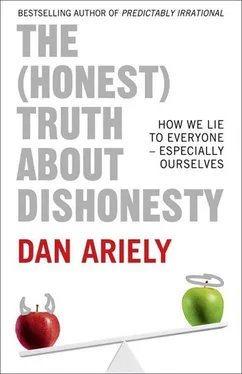Ariely, Dan - The (Honest) Truth About Dishonesty - How We Lie to Everyone – Especially Ourselves
Здесь есть возможность читать онлайн «Ariely, Dan - The (Honest) Truth About Dishonesty - How We Lie to Everyone – Especially Ourselves» весь текст электронной книги совершенно бесплатно (целиком полную версию без сокращений). В некоторых случаях можно слушать аудио, скачать через торрент в формате fb2 и присутствует краткое содержание. Жанр: Старинная литература, на английском языке. Описание произведения, (предисловие) а так же отзывы посетителей доступны на портале библиотеки ЛибКат.
- Название:The (Honest) Truth About Dishonesty: How We Lie to Everyone – Especially Ourselves
- Автор:
- Жанр:
- Год:неизвестен
- ISBN:нет данных
- Рейтинг книги:4 / 5. Голосов: 1
-
Избранное:Добавить в избранное
- Отзывы:
-
Ваша оценка:
- 80
- 1
- 2
- 3
- 4
- 5
The (Honest) Truth About Dishonesty: How We Lie to Everyone – Especially Ourselves: краткое содержание, описание и аннотация
Предлагаем к чтению аннотацию, описание, краткое содержание или предисловие (зависит от того, что написал сам автор книги «The (Honest) Truth About Dishonesty: How We Lie to Everyone – Especially Ourselves»). Если вы не нашли необходимую информацию о книге — напишите в комментариях, мы постараемся отыскать её.
The (Honest) Truth About Dishonesty: How We Lie to Everyone – Especially Ourselves — читать онлайн бесплатно полную книгу (весь текст) целиком
Ниже представлен текст книги, разбитый по страницам. Система сохранения места последней прочитанной страницы, позволяет с удобством читать онлайн бесплатно книгу «The (Honest) Truth About Dishonesty: How We Lie to Everyone – Especially Ourselves», без необходимости каждый раз заново искать на чём Вы остановились. Поставьте закладку, и сможете в любой момент перейти на страницу, на которой закончили чтение.
Интервал:
Закладка:
self-signaling, 122–26
basic idea of, 122
charitable acts and, 122–23
fake products and, 123–26, 135
what-the-hell effect and, 127–31
Sense and Sensibility (Austen), 154–55
service providers, long-term relationships with, 228–31
service records, exaggerated, 152–53
Sessions, Pete, 209
Sex and the City, 103–4
Shakespeare, William, 184
shareholder value, maximizing of, 208 n
Shiv, Baba, 99–100
shopping malls, susceptibility to temptation in, 113
Shu, Lisa, 45, 259
signing forms at top vs. bottom, 46–51
insurance claims and, 49–51
tax reporting and, 46–49
Silverman, Dan, 114–15
Simple Model of Rational Crime (SMORC), 4–6, 11–29, 53, 201, 238, 248
author’s alternative theory to, 27–28; see also fudge factor theory
guest lecturer’s satirical presentation on, 11–14
life in hypothetical world based on, 5–6
matrix task and, 15–23
tested in real-life situations, 23–26
sincerity, principle of, 220 n
Skilling, Jeffrey, 2
social norms, infectious nature of cheating and, 195, 201–3, 205–7, 209
social utility, collaborative cheating and, 222–23
South Africa, Truth and Reconciliation Commission in, 253–54
split-brain patients, 164
sports, self-deception in, 155–56
stealing:
Coca-Cola vs. money, 32–33
joke about, 31
resetting mechanisms and, 252–53
from workplace, 31, 33, 193
steroids, in sports, 155–56
storytelling:
creation of logical-sounding explanations and, 163–65
reinterpreting information in self-serving way in, 187–88
self-deception and, 142–43
Stroop task, 109–12
opportunity to cheat on, 111–12
Suckers, Swindlers, and an Ambivalent State (Balleisen), 188
sumptuary laws, 120
sunshine policies, 88, 91–92
suspiciousness of others:
fake products and, 131–34
self-deception and, 158–59
Tali (research assistant), 21, 24–26
Taliban, 152
Talmud, 45
Tang, Thomas, 44
tax returns, 45–49
IRS reaction to author’s findings on, 47–49
rationalization of exaggerated deductions in, 27–28
signing at top vs. bottom, 46–49
technological frontiers, potential for dishonesty and, 188
temptation, resisting of:
cognitive load and, 99–100
dieting and, 98, 109, 112–13, 114–15
ego depletion and, 100–116
evenings as difficult time for, 102
physical exhaustion and, 97–98
removing oneself from tempting situations and, 108–11, 115–16
in shopping malls, 113
Ten Commandments, 39–40, 41, 44, 204, 250
This American Life, 6–7
Three Men in a Boat (to Say Nothing of the Dog) (Jerome), 28
Time, 215
token experiment, 33–34
Tolkien, J. R. R., 223
Tour de France, 155
tragedy-of-the-commons situations, 40–41
travel reimbursements, 46, 47
Truth and Reconciliation Commission, 253–54
Turkey, cheating in, 242
University of California, Los Angeles (UCLA), 39–40
University of Newcastle, 224
University of Pittsburgh, 204–7
University of Waterloo, Canada, 155
Upside of Irrationality, The (Ariely), 177
U.S. Open (1925), 56
vending machine study, 194–95
veterans, exaggerated service records and, 152–53
Wall Street Journal, 135
Wang, Shirley, 241–42
Warner Bros., 150
watching or monitoring, as disincentive to cheating, 223–25, 227–28, 234–35
Watkins, Sherron, 215
Weiss, Dan, 6–7
what-the-hell effect, 127–31
combating moral deterioration of, 140
dieting and, 127, 130
fake academic credentials and, 136
fake products and, 127–31, 135
honesty threshold and, 130–31
resetting rituals and, 249, 250–53
white lies, 159–61
white matter, in brain, 170
Wilde, Oscar, 28
willpower, see temptation, resisting of
Wilson, Duff, 82
Wilson, James, 214–15
Wilson, Wim, 163–64
wishful blindness, 2
work hours, viewing decisions in terms of, 86 n
workplace, stealing at, 31, 33, 193
WorldCom, 13, 215
Yale, honor code experiment at, 41–42
Yang, Yaling, 168–70
Thanks
I find writing about academic research to be fulfilling and stimulating, but the pleasure that I get day in and day out comes from working jointly with amazing researchers/friends—coming up with ideas, designing experiments, finding out what works and doesn’t work, and figuring out what the results mean. The research described here is largely a product of my collaborators’ ingenuity and efforts (see the following biographies of my outstanding colleagues), and I am grateful that we have been able to travel together in the landscape of dishonesty and together learn a bit about this important and fascinating topic.
In addition, I am also thankful to social scientists at large. The world of social science is an exciting place in which new ideas are constantly generated, data collected, and theories revised (some more than others). Every day I learn new things from my fellow researchers and am reminded of how much I don’t know (for a partial list of references and additional readings, see the end of this book).
This is my third book, and by now one might expect that I would know what I am doing. But the reality is that I would not be able to do much without the help of many people. My deepest thanks go to Erin Allingham, who helped me write; Bronwyn Fryer, who helped me see more clearly; Claire Wachtel, who conducted the process with grace and humor that is rare in editors; Elizabeth Perrella and Katherine Beitner, who managed to be my human substitutes for both Adderall and Xanax. And the team at Levine Greenberg Literary Agency, who were there to help in every possible way. Aline Grüneisen made many suggestions, some that were very insightful and others that made me smile. I am also grateful to Ania Jakubek, Sophia Cui, and Kacie Kinzer. Very special thanks also go to the person who functions as my external memory, hands, and alter ego: Megan Hogerty.
Finally, where would I be without my lovely wife, Sumi? It takes a very special person to be willing to share a life with me, and my hectic life and workaholism don’t make it any easier. Sumi, I will move the boxes to the attic when I get home tonight. Actually, I will probably be late, so I will do it tomorrow. Well, you know what? I will definitely do it this weekend. I promise.
Loving, Dan
About the Author
Dan Ariely is the James B. Duke Professor of Psychology and Behavioral Economics at Duke University, with appointments at the Fuqua School of Business, the Center for Cognitive Neuroscience, the Department of Economics, and the School of Medicine. Dan earned one PhD in cognitive psychology and another PhD in business administration. He is the founder and director of the Center for Advanced Hindsight. His work has been featured in many outlets, including The New York Times , The Wall Street Journal , The Washington Post , The Boston Globe , and others. He lives in Durham, North Carolina, with his wife, Sumi, and their two creative children, Amit and Neta.
www.danariely.com
Notes
Introduction: Why Is Dishonesty So Interesting?
1. Ira Glass, “See No Evil,” This American Life , National Public Radio, April 1, 2011.
Chapter 1. Testing the Simple Model of Rational Crime (SMORC)
1. “Las Vegas Cab Drivers Say They’re Driven to Cheat,” Las Vegas Sun , January 31, 2011, www.lasvegassun.com/news/2011/jan/31/driven-cheat/.
Читать дальшеИнтервал:
Закладка:
Похожие книги на «The (Honest) Truth About Dishonesty: How We Lie to Everyone – Especially Ourselves»
Представляем Вашему вниманию похожие книги на «The (Honest) Truth About Dishonesty: How We Lie to Everyone – Especially Ourselves» списком для выбора. Мы отобрали схожую по названию и смыслу литературу в надежде предоставить читателям больше вариантов отыскать новые, интересные, ещё непрочитанные произведения.
Обсуждение, отзывы о книге «The (Honest) Truth About Dishonesty: How We Lie to Everyone – Especially Ourselves» и просто собственные мнения читателей. Оставьте ваши комментарии, напишите, что Вы думаете о произведении, его смысле или главных героях. Укажите что конкретно понравилось, а что нет, и почему Вы так считаете.












